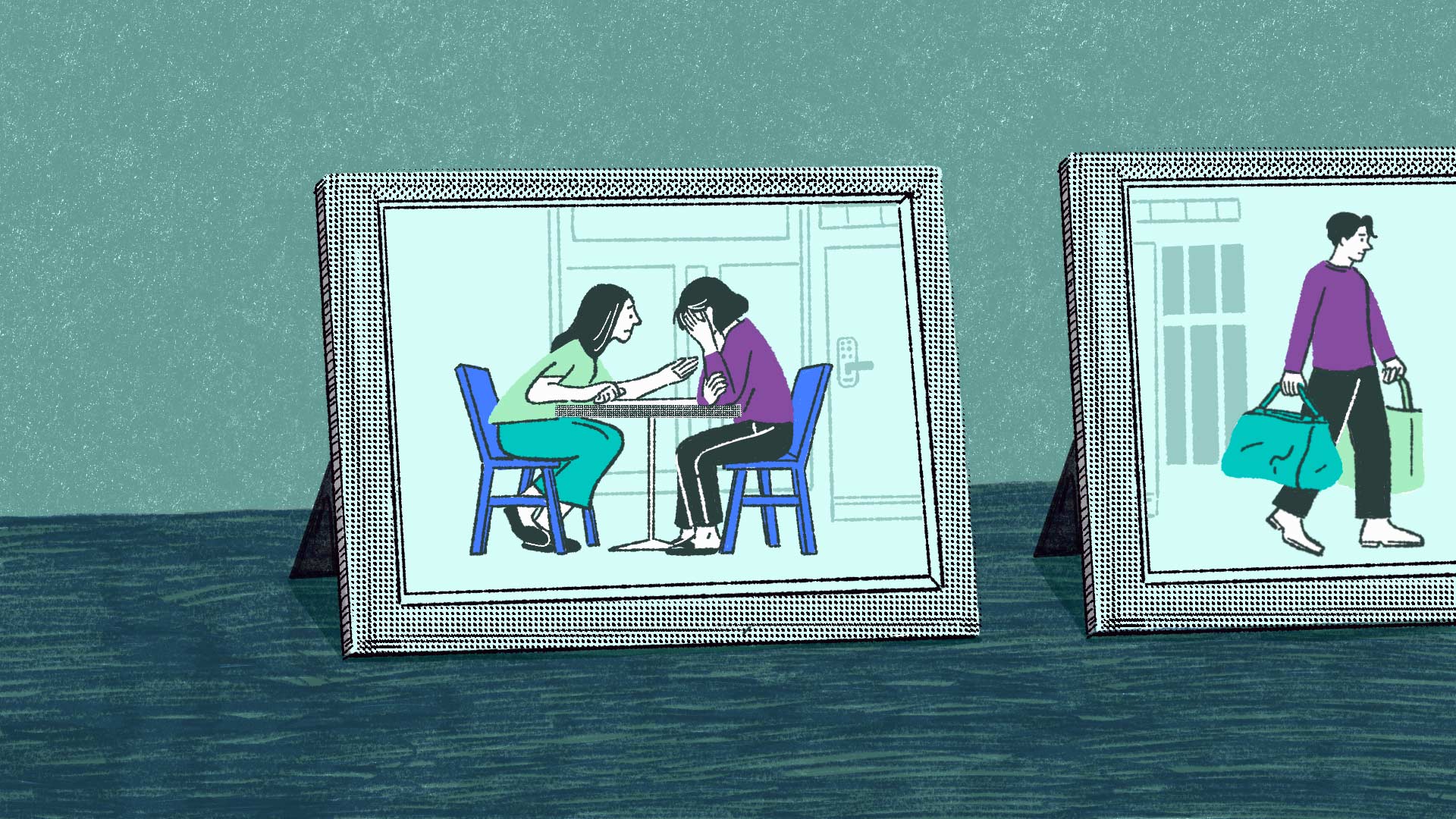
Editor’s note: Divorce is never what God wants, but it does happen, even in Christian marriages. What is written here is meant to focus only on the importance of extending compassion and love to someone who is grieving.
Genevieve’s voice poured through the phone. She’s going through court proceedings following a horrific divorce. That’s not to mention the affair, the pregnant mistress, the mental disorders, and the gaslighting. Her descriptions called to mind a life upturned, shaken violently, and spilled.
Pieces of her former life had fallen from view: she’s lost her main ally in the face of the world’s onslaught. A co-parent and advocate for their boys. Her partner to pick up the kids, fix the washing machine, settle the bills. A calm presence after a nightmare. A lover of her body.
Some pieces felt irretrievable: her kids’ sense of safety and trust. Couple-friendships. Respect of their church community. Her dream to stay home with her kids.
Genevieve described her divorce as “the death of my close, intact, original family forever”.
Give Us This Day 22
Get our latest family devotional!
Our latest devotional, Give Us This Day 22, is now available.
Get a copy
Every month, we roll out a new resource for families. Subscribe to our email updates, and be the first to get a copy!
The Emotional Kaleidoscope
Grief, including grief after divorce, doesn’t always look like sadness.
Sometimes it looks like keeping up appearances. Loneliness. Fury. Denial. Anxiety. Unadulterated fear.
I couldn’t help but hear Genevieve’s haunting repetition of a single word about how she felt: dirty. It popped up again and again, like an ugly loose thread in a sweater. Beneath “dirty”, I heard shame.
Divorce seems so often associated with failure and shame—especially for Christians. She’d grown up in a church that shunned divorce in nearly every circumstance. And now, the lack of acceptability is perched on her shoulder, constantly whispering in her ear. Divorced. Failure.
In these moments, we as friends carry a key opportunity: redeeming the unspoken messages of divorce with love and acceptance. This is our chance to show our friends how Jesus loves them—a love that’s very different from an ex-spouse’s.
Helping a Friend Move from Grief to Restoration
1. Make time for the long haul
Like any other grief, anticipate that the first six months, then the first year (holidays, birthdays, and heartrending milestones), will be the hardest. It’s helpful to picture grief as soundwaves: first, the crests and troughs are close together. But these waves stretch out.
Walking with friends through their new, divorced normal may take the time we don’t seem to have—and again, it’s not always fun or pretty. You may witness your friend at their absolute worst. Ugly-crying. Blaming. Ungrateful. Snippy. Petrified.
Love is hard. But it’s always a worthwhile investment of our time.
You may be thinking, “What if I don’t know what to say?”
Never underestimate the power of presence—of simply being with someone. Job’s friends did their best work, actually, when they were silent! German theologian Dietrich Bonhoeffer wrote these wise words, reminding us of the danger of always pressing for a helpful response:
Just as our love for God begins with listening to God’s Word, the beginning of love for other Christians is learning to listen to them … So often Christians, especially preachers, think that their only service is always to have to ‘offer’ something when they are together with other people. They forget that listening can be a greater service than speaking.
So, pray as you listen—even if you wonder if your friend could still save their marriage.
“Listening can be a greater service than speaking.”
Use the guidelines in Ephesians 4:29 as your mouth’s filter: “Do not let any unwholesome talk come out of your mouths, but only what is helpful for building others up according to their needs, that it may benefit those who listen.”
Your goal is to help your friend make it through this most intense season. Help them cling to Jesus (not you) as Wonderful Counsellor, Mighty God, Everlasting Father, Prince of Peace (Isaiah 9:6).
2. Ask good questions
A couple of years ago, I received a call during a business meeting telling me that my home was on fire.
Fires have to be extinguished first (obviously) before the damage can be assessed. Even the water to put out the fire—what you might liken to divorce proceedings in this analogy—created devastating damage.
But to begin the repair, much of the house had to be gutted. There was accrued mould and water damage, leading to more than one tear-out. These would have made for unstable new structures.
Asking good questions to help your friend think deeper can help prevent further damage caused by the rot of bitterness. You’re helping to find and remove what must go, to turn them away from resentment and hopelessness.
Show God’s face to them as you listen. Receive. Mourn with. Tell the truth.
Here are some questions you might ask:
- What are you missing right now?
- What’s tough to forgive right now? (After expressing genuine compassion and working to understand, you could say: “Let me pray with you about that.”)
- What “tapes” of negative self-talk and hurtful conversations are playing over and over in your head? Which of God’s truths can combat them?
- What are three pieces of practical help that would make a big difference right now? (This helps your friend think of solutions rather than sink into hopelessness.)
- How is your identity affected right now? (This is a good chance to speak truth to your friend about how Jesus responds—see section above.)
- What kind of future would give you hope right now? What’s one step you can take toward that?
Proverbs 25:11 (ESV) reminds us: “A word fitly spoken is like apples of gold in a setting of silver”. Acting as a guide for grief carries tremendous power to help restore the person revealing the pain of their story. Show God’s face to them as you listen. Receive. Mourn with. Tell the truth.
3. Build well
Your friend is in a rebuilding process. Genevieve remarks that the experience had shaken her faith—but also deepened it.
Your job is to steer your friend not towards hatred of an ex—or the equivalent of rotten interior structure. It’s encouraging a neutral tone with the kids (who need to process, too, but not with an angry adult taking sides).
Building well also doesn’t mean getting your friend dating again, which could be a lot like smoothing over gaping holes that are still reeking of mould.
What could rebuilding well look like? Consider how you can help them work towards things such as . . .
- Establishing sustainable routines, and empowering the kids to pitch in more (while acknowledging their grief, too).
- Making time for adequate sleep, time off, and regular physical fitness your friend enjoys. Avoid the false comfort of addiction.
- Enjoying the good distraction of fulfilling work—without being consumed by it.
- Addressing life one day at a time in doable, bite-sized chunks: “I will finish my resume today. Tomorrow I’ll figure out how much we owe on the car loan”; and letting go of activities they can’t handle anymore.
- Identifying a list of problems to be solved, and seeking advice on what overwhelms them: finances, parenting issues, whether to put their house on the market.
- Seeing a counsellor.
- Plugging into a divorce support network.
- Refusing to spend more time than necessary in rehearsing the “shoulda-coulda-woulda’s.” As friend, is your help life-giving, nudging them in the direction of a healthier place? Does it encourage them to think about what’s true, noble, right, pure, lovely, and admirable (Philippians 4:8–9)?
- Choosing to forgive and intentionally heal all over again whenever a new grief surfaces.
Genevieve’s story extends deep hope. “I’m surprised about the amount of personal growth that occurred for me . . . that something as horrific as what I experienced can lead to beautiful things,” she told me. Being able to regain and re-experience things like the safety of her children, peace of mind, and the hope of a different future.
This mimics the psalmist’s heart of thanksgiving in Psalm 126: “When the LORD restored the fortunes of Zion, we were like those who dreamed . . . Those who sow with tears will reap with songs of joy” (vv. 1, 5).
4. With a dedicated group of others, see how you can practically step in
Pro tip: Burned out friend ≠ helpful friend.
Keep a sustainable pace. Set generous boundaries. And delegate to others! This is where the body of Christ comes in—not you alone as the superhero.
Chances are, single parents will always need some community help. There are practical ways you and other friends can be the (temporary) “training wheels” until your friend can ride a little more on their own—like bringing over dinner, helping them to pack if they’re moving house, scheduling a massage, or steering them away from wrong or vengeful behaviour.
Together, you’ll be showing Jesus to a friend at a time when his or her life looks like nothing but a valley of dry bones. Locking arms is your chance to journey with your friend, as you show them how Jesus might compassionately walk with them towards the hope and future of restoration in Him.
This article was originally published in janelbreitenstein.com. Adapted with permission.





